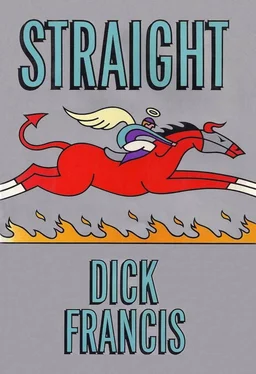Bathos and drama, I thought: his everyday life. I crutched all the way down to the general reception area, found Brad, gave him an update and told him I might be a long time. All night perhaps.
He waved a permissive hand. He would be around, he said, or he would leave a message at the desk. Either way, I could reach him. I nodded and went back upstairs, and found the waiting room already occupied by a very young couple engulfed in grief, whose baby was hanging on to life by threads not much stronger than Greville’s.
The room itself was bright, comfortable and impersonal, and I listened to the mother’s slow sobs and thought of the misery that soaked daily into those walls. Life has a way of kicking one along like a football, or so I’ve found. Fate had never dealt me personally a particularly easy time, but that was OK, that was normal. Most people, it seemed to me, took their turn to be the football. Most survived. Some didn’t.
Greville had simply been in the wrong place at the wrong time. From the scrappy information known to the hospital, I gleaned that he had been walking down Ipswich High Street when some scaffolding that was being dismantled had fallen on him from a considerable height. One of the construction workers had been killed, and a second had been taken to hospital with a broken hip.
I had been given my brother’s clinical details. One metal beam had pierced his stomach, another had torn into his leg; something heavy had fallen on his head and caused brain damage with massive cerebral bleeding. It had happened late the previous afternoon; he had been deeply unconscious from the moment of impact and he hadn’t been identified until workmen dealing with the rubble in the morning had found his diary and given it to the police.
“Wallet?” I asked.
No, no wallet. Just the diary with, neatly filled in on the first page, Next of Kin, Derek Franklin, brother; telephone number supplied. Before that, they had had no clue except the initials G.S.F. embroidered above the pocket of his torn and bloodstained shirt.
“A silk shirt,” a nurse added disapprovingly, as if monogrammed silk shirts were somehow immoral.
“Nothing else in his pockets?” I asked.
“A bunch of keys and a handkerchief. That was all. You’ll be given them, of course, along with the diary and his watch and a signet ring.”
I nodded. No need to ask when.
The afternoon stretched out, strange and unreal, a time-warped limbo. I went again to spend some time with Greville, but he lay unmoving, oblivious in his dwindling twilight, already subtly not himself. If Wordsworth were right about immortality, it was the sleep and the forgetting that were slipping away and reawakening that lay ahead, and maybe I should be glad for him, not grieve.
I thought of him as he had been, and of our lives as brothers.
We had never lived together in a family unit because, by the time I was born, he was away at university, building a life of his own. By the time I was six, he had married, by the time I was ten, he’d divorced. For years he was a semistranger whom I met briefly at family gatherings, celebrations which grew less and less frequent as our parents aged and died, and which stopped altogether when the two sisters who bridged the gap between Greville and me both emigrated, one to Australia and one to Japan.
It wasn’t until I’d reached twenty-eight myself that af ter a long Christmas-and-birthday-card politeness we’d met unexpectedly on a railway platform and during the journey ahead had become friends. Not close time-sharing friends even then, but positive enough for telephoning each other sporadically and exchanging restaurant dinners and feeling good about it.
We had been brought up in different environments, Greville in the Regency London house which went with our father’s job as manager of one of the great landowning estates, I in the comfortable country cottage of his retirement. Greville had been taken by our mother to museums, art galleries and the theater: I had been given ponies.
We didn’t even look much alike. Greville, like our father, was six feet tall, I three inches shorter. Greville’s hair, now graying, had been light brown and straight, mine darker brown and curly. We had both inherited amber eyes and good teeth from our mother and a tendency to leanness from our father, but our faces, though both tidy enough, were quite different.
Greville best remembered our parents’ vigorous years; I’d been with them through their illnesses and deaths. Our father had himself been twenty years older than our mother, and she had died first, which had seemed monstrously unfair. The old man and I had lived briefly together after that in tolerant mutual noncomprehension, though I had no doubt that he’d loved me, in his way. He had been sixty-two when I was born and he died on my eighteenth birthday, leaving me a fund for my continued education and a letter of admonitions and instructions, some of which I’d carried out.
Greville’s stillness was absolute. I shifted uncomfortably on the crutches and thought of asking for a chair. I wouldn’t see him smile again, I thought: not the lightening of the eyes and the gleam of teeth, the quick appreciation of the black humor of life, the awareness of his own power.
He was a magistrate, a justice of the peace, and he imported and sold semiprecious stones. Beyond these bare facts I knew few details of his day-to-day existence, as whenever we met it seemed that he was always more interested in my doings than his own. He had himself owned horses from the day he telephoned to ask my opinion: someone who owed him money had offered his racehorse to settle the debt. What did I think? I told him I’d phone back, looked up the horse, thought it was a bargain and told Greville to go right ahead if he felt like it.
“Don’t see why not,” he’d said. “Will you fix the paperwork?”
I’d said yes, of course. It wasn’t hard for anyone to say yes to my brother Greville: much harder to say no.
The horse had won handsomely and given him a taste for future ownership, though he seldom went to see his horses run, which wasn’t particularly unusual in an owner but always to me mystifying. He refused absolutely to own jumpers on the grounds that he might buy something that would kill me. I was too big for Flat races; he’d felt safe with those. I couldn’t persuade him that I would like to ride for him and in the end I stopped trying. When Greville made up his mind he was unshakable.
Every ten minutes or so a nurse would come quietly into the room to stand for a short while beside the bed, checking that all the electrodes and tubes were still in order. She gave me brief smiles and commented once that my brother was unaware of my presence and could not be comforted by my being there.
“It’s as much for me as for him,” I said.
She nodded and went away, and I stayed for a couple more hours, leaning against the wall and reflecting that it was ironic that it was he who should meet death by chance when it was I who actively risked it half the days of the year.
Strange to reflect also, looking back now to that lengthening evening, that I gave no thought to the consequences of his death. The present was vividly alive still in the silent diminishing hours, and all I saw in the future was a pretty dreary program of form-filling and funeral arrangements, which I didn’t bother to think about in any detail. I would have to telephone the sisters, I vaguely supposed, and there might be a little long-distance grief, but I knew they would say, “You can see to it, can’t you? Whatever you decide will be all right with us,” and they wouldn’t come back halfway round the world to stand in mournful drizzle at the graveside of a brother they’d seen perhaps twice in ten years.
Читать дальше












